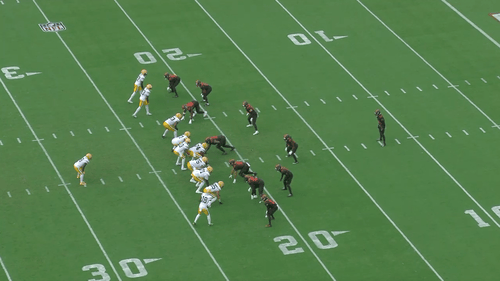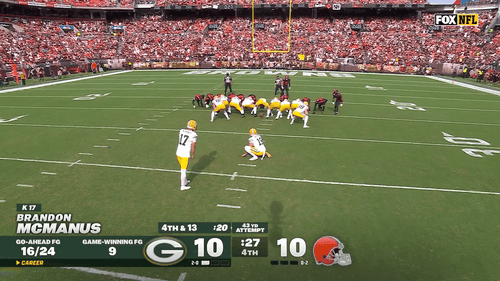Fluke or f*cked? Unpacking Green Bay's surprising loss in Cleveland
The Packers dropped a game that few expected them to lose. In the wake of the defeat, some parts of the performance seem like flukes while others look like long-term concerns.
Good morning!
The Green Bay Packers lost 13-10 to the Cleveland Browns on Sunday. The game comes as a surprise given the previous two weeks for both teams, the relative health of the two rosters entering the game, and a handful of other factors.
Today's edition of The Leap takes a different approach than our usual Monday newsletters. Instead of the notebook-style coverage we typically offer following games, we will instead look at several aspects of the Packers' performance on Sunday and place them in one of two categories: fluke or f*cked.
Thank you for reading and supporting our coverage. You can also support our work by following us on social media:
Jason B. Hirschhorn: @by_JBH on Twitter / @byjbh@bsky.social on Bluesky / @by_jbh on Threads
Peter Bukowski: @Peter_Bukowski on Twitter / @peterbukowski@bsky.social on Bluesky / @peter_bukowski on Threads
The Leap: @TheLeapGB on Twitter / @theleap.bsky.social on Bluesky / The Leap's YouTube channel
If you appreciate thoughtful, independent coverage of the Packers and NFL, please consider becoming a paid subscriber. Your support allows us to serve this community with the stories and reporting it deserves.
As always, thanks for making The Leap a part of your day.
Fluke or f*cked: Green Bay's pass protection
The Packers probably felt some degree of relief heading into Sunday's game with the return of left guard Aaron Banks and right tackle Zach Tom. Both missed the previous week's game, forcing Jordan Morgan and a rotation of Anthony Belton and Darian Kinnard to fill in the gaps. A matchup with a Myles Garrett-led defensive front doesn't make for an easy afternoon, but having a full set of blockers at least makes the task more palatable.
That relief lasted all of one play.
On the opening play of the Packers' first possession, Tom aggravated the oblique injury that kept him on the shelf in Week 2. He didn't return, an outcome that seemed obvious from the moment he made it to the sideline after suffering the setback. Banks too later exited the game prematurely due to injury and couldn't re-enter the game.
Green Bay has handled O-line shuffling reasonably well in the past. However, Sunday proved to be more challenging. Quarterback Jordan Love officially took three sacks before halftime, though he absorbed another on a play negated by an unrelated defensive penalty. Love finished with five sacks taken, tying a career high.
It remains uncertain how much time Banks and Tom will miss as a result of their latest injuries. It seems less uncertain how much of an issue health has become for the offensive line. Not only have the Packers played the majority of the first three games without their best lineman, but the weekly reconfigurations have lowered the floor for the unit. The fluidity also appears to have negatively affected Jordan Morgan, who has yet to settle in at either tackle or guard and led the team with three pre-snap penalties on Sunday.
Verdict: Fluke
While the blocking didn't come close to meeting the standard in Week 3, the Packers shouldn't have this level of personnel fluctuation all season. And even if Banks and Tom don't return until sometime after the bye, Green Bay doesn't face a defensive front as menacing as the Browns until Week 10's matchup with the Philadelphia Eagles.
The Packers have to iron out some issues, but they have the requisite talent, time, and coaching to do so. Love also takes sacks at one of the lowest rates in the league. This shouldn't remain a problem.
Fluke or f*cked: Green Bay's ground game
In addition to the issues in pass protection, the Packers struggled to move the ball on the ground as well on Sunday. They averaged a pathetic 2.6 yards per attempt, a figure that drops to 2.3 after removing Love's rushes. Josh Jacobs, the team's star running back, rushed for just 30 yards on 16 carries and snapped his streak of consecutive games with a touchdown. The contest marks his lowest rushing output and running efficiency since arriving in Green Bay.
Perhaps the most troubling sequence came at the end of regulation. With the offense positioned just outside the red zone and the score tied, the Packers utterly failed to move the ball on the ground. Jacobs rushed on back-to-back plays for a net of no gain, followed by a 2-yard run after a false start pushed them back 5 yards. Granted, Green Bay wanted to kill the clock at that point to set up the potential game-winning kick, but the running back had to navigate around defenders in the backfield on each of those plays. He also nearly fumbled away the possession.
The team's plan to bulk up along the O-line interior and run it through opponents' faces has yet to pan out this season, and the Cleveland game represents the nadir to this point. The increased size of the unit hasn't made rushing up the gut any easier. Considering how much Green Bay leaned on its ground game in 2024, this decline looks particularly concerning. If nothing else, the team needs to figure out how to effectively chew chock after the defense puts the clamps on opponents.
Verdict: F*cked
Sure, the ground game isn't "f*cked" to the same degree that, say, the Miami Dolphins appear to be. The production will improve from its lowly state on Sunday.
However, we only have two categories to work with in this exercise, and too many issues have cropped up to bucket the rushing struggles as a fluke. So much of the ground game relies on the offensive line to clear paths, and that simply hasn't happened with consistency. The Packers have already tried to hammer defenses straight ahead as well as stretch them horizontally, both to little avail.
The Packers don't necessarily need to reinvent the rushing attack like it did last year with the spinner series. However, the coaching staff will need to find some other approach or personnel solution to fix the problem.
Fluke of f*cked: Special-teams units
The third phase has long haunted the Packers, and it shows no signs of abating. Sunday's early slate included three blocked kicks, and, naturally, one of them came at Green Bay's expense.
After the Browns tied the game with just over three minutes left in regulation, the Packers quickly moved into scoring position. A defensive pass interference pushed the offense past midfield, and Love then connected with tight end Tucker Kraft for 18 more yards to move just outside the red zone. The offense stalled at that point, with Jacobs nearly fumbling away the ball and the ground game grinding to a halt as detailed above. Still, Green Bay had a chance for a go-ahead field goal with less than 30 seconds left.
Then, like a Greek tragedy, the inevitability of destiny hit the Packers in the face.
At that point, Green Bay had to hold Cleveland out of field-goal range and play for overtime. However, a neutral-zone infraction on Micah Parsons and a few short passes positioned the Browns at the outer reaches of kicker Andre Szmyt's range. He banged it through on the gam'es final play.
Verdict: F*cked
Understandably, the game's final minute will characterize the Packers' special-teams blunders in the eyes of most observers. However, Green Bay also misplayed a punt earlier in the fourth quarter that forced the offense to take over at the 2-yard line. That drive lasted just over two minutes, effectively giving the Browns an extra possession in a 10-point game.
Whereas the Packers could plausibly fix the issues hindering them in the ground game, no evidence exists to suggest that a solution exists for their special teams. The units have only improved under coordinator Rich Bisaccia insofar as they no longer rank among the very worst in the NFL. They cost the Packers in big moments before 2025, and they've already cost them a game this season.





Excellent points and Jacobs did look physical and fairly explosive on that 31-yard catch and run. I really appreciate you and Peter posting articles that are incisive, succinct and a cut above what else is out there in terms of Packers coverage.
No mention of #23 looking like the more effective runner than #8; is Jacobs nearing the end of is it all about the shoddy blocking?